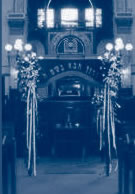|
SEDRA : KI TETZE Hertz Chumash p. 840 Deuteronomy
Chap.21 verse 10
This week's Sedra is generously sponsored by Maitland Lincoln.
SYNOPSIS:
The Torah introduces the subject of a female captives in
battles occurring outside Israel. One may not, as was the
custom with the neighbouring nations, force free female captives
into marriage. The captive was first to shave her head, cut
her nails, remove the garments in which she was captured and
mourn her parents a full month thus rendering herself unattractive
to her Israelite capturer. If then he still wished to marry
her this was possible, if not she could not be treated as
a slave. (Warring armies were usually followed by beautiful
women provocatively adorned in an attempt to be `snapped up'
by the warrior heroes. If the battle was lost these women
usually became captives of the conquerors who dealt with them
ruthlessly ... not so Israel).
The inheritance entitlement of the first born son is a double
portion, even where there were two wives, and he was the son
of the despised wife.
The rebellious son, who offended in various defined ways,
was subject to death by stoning. (as no instance of this law
ever being put into practise is recorded, our Sages regard
it as an ominous warning). The body of one who was hanged
should not remain on the hanging tree overnight. He must be
buried the same day.
Lost articles are to be returned to their owners.
Railings must be built around the roof or any platform, as
a safety precaution.
Shaatnez (a mixture of wool and linen in the same garment)
may not be worn.
Tzitzit must be attached to the corners of garments.
A husband who falsely accuses his bride of having been unfaithful
to him before their marriage but after being betrothed, is
to receive lashes and a fine. If the charges prove to be true,
the wife is to be stoned. If a woman commits adultery, both
she and the man involved are subject to death. Marriage to
one's father's wife, or a member of Ammon or Moab is forbidden.
One should not charge interest to a fellow Jew.
Whoever utters a vow must fulfill it.
When a husband has grounds for divorce, the marriage is to
be dissolved in a formal legal proceeding, involving a Get
(Bill of Divorce). If the woman marries again and becomes
a divorcee or a widow, she cannot remarry her first husband.
If one lends money to a fellow Jew, he must not take as a
security something that provides the borrower with a livelihood.
If the borrower is poor, the lender should return the security
at night if it is needed then. Hired workers are to be paid
immediately on the completion of the work.
If a married man dies leaving no child, his brother is to
perform yibum - the levirate marriage. The resultant child
will perpetuate the deceased's name. If the surviving brother
refuses to marry the widow, he would have to perform Chalitzah
(levirate divorce) because he did not perpetuate his brother's
name.
Merchants and businessmen are warned to be extremely scrupulous
in their trading. They must not have faulty scales and weights
or try to cheat the customer.
Finally, the Jews are told to remember for all time the perfidious
actions of Amalek, who attacked the Israelites when they were
weak. They must blot out the remembrance of Amalek from the
earth.
HAPHTORAH HERTZ CHUMASH P 857 Isaiah Chap 54 verse 1
This is the fifth of the Haphtorot of comfort taken from
the prophecies of Isaiah. Describing Israel as a widow or
abandoned wife G-d Himself will unite with her in everlasting
loving kindness.
TELL ME RABBI ..... WHAT IS BATMITZVAH?
A boy has a Bar Mitzvah on the day after his 13th birthday.
He becomes obligated to fulfill the Mitzvot, especially the
immediate mitzvah of Tefillin. A girl becomes obligated to
fulfill the Commandments on the day after her 12th birthday
but she does not have a unique Mitzvah which immediately she
must fulfill.
On the day a girl becomes eligible for Mitzvot, it is highly
desirable to arrange a celebration to mark this special occasion
in her life. The celebration should be in the midst of family
and friends and should include the participation of a Rabbi.
The Rabbi should speak about the great significance of the
occasion and encourage the observance and study of Torah.
It is desirable for the girl to wear a new dress and to bless
"Shehecheyanoo" over it. She should also prepare
a short address appropriate to the significance of the day.
The father should also declare the special blessing similar
to the one recited for a boy :
"Blessed is He who has absolved me of religious liability
for this girl". (Based on a letter to a young girl by
the Late Rishon Le-Tzion, Sephardi Chief Rabbi of Israel -
Rabbi Nissim.)
BACK TO SHABBAT SHALOM
TABLE
|








